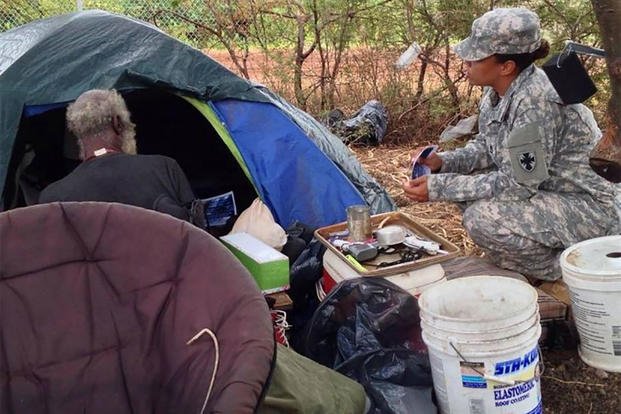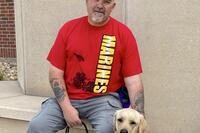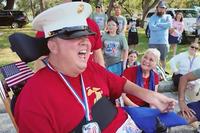Chris Vidaurre is the senior program manager for health and well-being within the Military Service Initiative at the George W. Bush Institute.
The opinions expressed in this op-ed are those of the author and do not necessarily reflect the views of Military.com. If you would like to submit your own commentary, please send your article to opinions@military.com for consideration.
Taking care of our own is what Marines do, something that might have seemed like a platitude but gained personal resonance after I left the Corps.
Shortly after departing the Marines, separated from the structure of service and left to grapple with my thoughts and emotions, my world spiraled. I ended up living on the streets of San Antonio and in a homeless shelter.
I was overcome by "the invisible wounds of war" and became a statistic -- another homeless veteran struggling with mental illness. My relationships with friends and family were wrecked, and my ex-fiancée reached her limit and could no longer handle my mood swings, consistent anger, and hatred toward others. I didn't know what to do and felt completely lost.
A fellow Marine heard of my situation and offered to help. His family took me in and ensured I was safe and had people who cared for me.
As we head into this season of gratitude, I'm thankful for those who helped me through this dark chapter in my life. These experiences, and others I had while in the Marines, have led me to my true calling and lifelong mission: to take care of other veterans, military service members and their families. As many prepare for holiday celebrations, I call on my fellow veterans -- and the public -- not to forget our brothers and sisters in arms who are struggling, or their families.
It took me nine months to get back on my feet and be able to live on my own once again. But I'm one of the fortunate ones. Without the support of my fellow veteran and his family -- and their bigheartedness -- I honestly don't know where I'd be right now.
When you join the military, you know more or less what you have signed up for, and part of that is the possibility of making the ultimate sacrifice. But most don't think of the subsequent mental health challenges or the possible burden they impose on families.
I served in the United States Marine Corps Wounded Warrior Battalion East (WWBn-E), where I was part of the Marine Corps Liaison that aided wounded, ill and injured Marines and their family members at the San Antonio Military Medical Center (SAMMC) and Walter Reed National Military Medical Center (WRNMMC). This allowed me to see firsthand the huge impact military service has on family members -- and not in the way you would expect.
Often, family members speak highly of their loved ones' service after they honorably served in combat and came back unscathed. This wasn't the case for the family members at SAMMC and WRNMMC. Instead, we saw the pain, fear and strong, unidentified emotions that ran through these family members daily.
It didn't dawn on me until many months later that it could have been my loved ones, seeing me in a hospital with an unexpected illness or a combat injury, or sitting there with fewer limbs than I had left with. For the two and a half years I served with this unit, I treated every family as if they were my own and demanded my fellow Marines give the same respect. We had never met these family members before, but we were willing to do whatever we could to ensure their service member was receiving the proper treatment and that all of their needs were met during their time of distress.
After I became a veteran, after my life went off the rails and after it got back on track, I realized something: All veterans have a responsibility to pay it forward. And I will do all that I can to prevent my service brothers and sisters and their families from going through the same hardships that I endured.
After nearly 12 years of service in both the active and reserve components, four deployments and five duty stations, and after homelessness, anger management classes and court-ordered mental health care, my life will never be the same. I have a new mission and commitment to serve others that began at the Steven A. Cohen Military Family Clinic at Endeavors, a faith-based organization that works to restore dignity and improve the quality of life of vulnerable populations, including veterans and their family members.
Now, I have a new opportunity: to continue to fulfill my mission of serving veterans at the George W. Bush Institute, which I recently joined as health and well-being program manager for the Military Service Initiative. This will allow me to work with like-minded individuals to shape a future for veterans in areas such as leadership development, education, economic opportunity, and health and well-being.
I know I am a part of something much greater than myself that has been guided and inspired by President and Mrs. Bush. I am excited about the mission that lies ahead.















